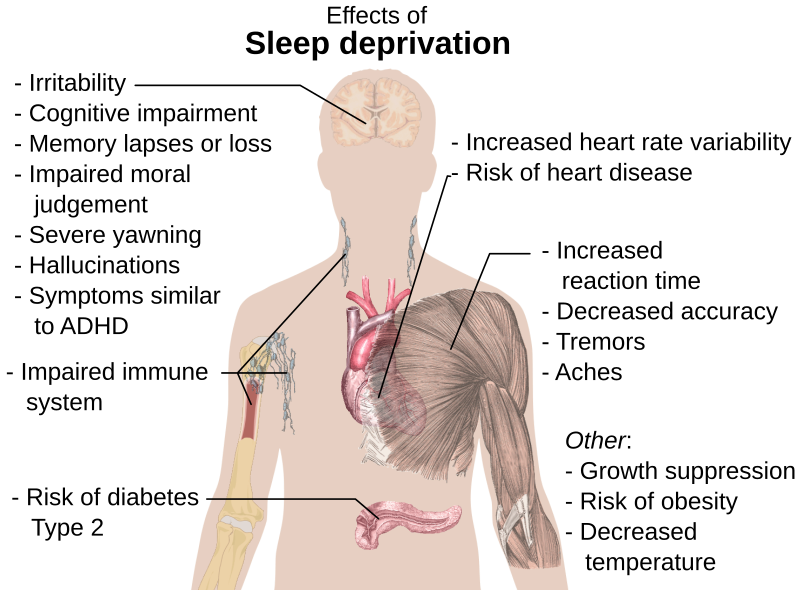Science Says Slouching Might Boost Your Brain's Performance
Sleep deprivation is pretty common these days—it'south a major aspect of achievement-oriented societies—but why would anyone accept a love-hate human relationship with it? Unremarkably, one would say,sleep deprivation and all the accompanying symptomsare the definition of a love-hate relationship, to the core.
Permit me tell you lot something: you canuse sleep deprivation for your own benefit. Nosotros'll get into how this works, merely commencement, let'south discuss the miracle of sleep, sleep impecuniousness and its symptoms, and finally design a "how to" experiment nigh sleep deprivation(unremarkably known as self-torture), and ask ourselves, more importantly, why?
Sleep: Functionality
"Sleep is a naturally recurring state characterized by reduced or absent consciousness, […] and inactivity of nearly all voluntary muscles." (Macmillan, 1981). This is a short and clear caption:
- slumber is characterized past sleep stages/cycles (five cycles, differing in depth)
- the deeper your sleep, the ameliorate the quality of sleep
- More Sleep ≠ Better (salubrious avg. 7.5-9 hours)
The functions of sleep are very multifaceted and majorly unexplored, but these (validated, and commonly accustomed) aspects involvement us the nigh correct now. Sleep has a major impact:
- on our retentiveness and the ability to re-organize thoughts, experiences and to learn new things (neuroplasticity)
- on the regulation of necessary hormones and the ability of our torso to regenerate physically
What is Sleep Deprivation?
Sleep impecuniousness is the lack of sleep: either information technology was acquired by a very superficial and brusque sleep (over a catamenia of some days) or by no sleep at all. The functionality and benefits of sleep are limited equally a result (see in a higher place), and we might face someserious bug, if we stay sleep-deprived for a prolonged flow of fourth dimension.
The furnishings of sleep deprivation are various; some occur instantly lateracute impecuniousness, other occur merely afterwardchronic deprivation:

(by Mikael Häggström, Wikimedia Eatables, 2009)
After astute impecuniousness:
- irritability
- cognitive impairment
- memory lapses
- restricted judgement
- severe yawning
- increased center-rate variability, increased reaction time and decreased accurateness
- temporary emotional instability
After chronic deprivation:
The effects of chronic deprivation boil downwards to the development of various diseases, such as:
- Diabetes
- heart disease
- growth suppression
- restricted allowed system functionality
- weight gain/loss
- depression
Due to the diversity of acute deficits, slumber deprivation has been used equally a successful interrogation technique. In fact, the U.S. military authorised sleep deprivation every bit an interrogation method (Leave no Marks: Enhanced Interrogation Techniques and the Take a chance of Criminality, Baronial 2007).
But hey, why would there exist alove-hate human relationship here? What's the benefit for us?!
How To (..and the benefits of sleep deprivation?!)
The effects of sleep deprivation on the human body were observed and analyzed in the 70s: the methodological monitoring involved claret assay, but also neuropsychological instruments to capture the brain activity during slumber-deprivation and duringrecovery sleep subsequently deprivation.
The results:"There'southward evidence of antidepressive effect after slumber deprivation."Every bit a matter of fact, subjects experienced a37.ii % improvement in their mood!
The background of these results are various—the reasons behind the remarkable mood improvement are, amongst others:
- biochemical investigations proved an increase of different hormones, including serotonin and noradrenaline, which are besides known to functionevery bit a happiness hormone (serotonin) and stimulating hormone (noradrenaline)
- improved sleep continuity and depth in the night after sleep deprivation
These mentioned effects take activity in depressedjust besides non-depressed people,meaning that you can stay awake for a night, begin the next day as you usually practise and endeavor to keep yourself awake (that'due south not very piece of cake!) and get to bed quite early on → sleep similar a baby → wake upwardly the adjacent morning withmore power and free energy.
By depriving yourself of sleep, youset your biological clock to zero— in case your fourth dimension management is messed up and running out of fuel, this tin very helpful (a beloved-hate relationship). Y'all can phone call sleep deprivationsleephacking: at first nosotros abstain from sleep, and later on (during the recovery night) we slip into a very deep land of sleep, which will regenerate u.s.a..
Admittedly, sleep deprivation amongst healthy people is often met with skepticism, mainly considering healthy subjects can regulate their sleep blueprint in other ways (through nutrition, sleep hygiene and sleep rituals). On the other manus, sleep deprivation is free of whatsoever serious side effects and can serve as a quick set. Here's a short how-to:
- Perform your slumber deprivation "experiment" on the weekend (working in a sleep deprived state can be difficult)
- Keep yourself awake during your slumber deprivation dark (and the post-obit day) with the help of tea or coffee, but please don't overdo it
- Go to bed early your sleep-deprived day, and enjoy your deep recovery night (7.5 – nine hours)
- Wake upwards powerful and energized, feeling similar a million dollars
After your sleep deprivation experiment you should accept intendance of a well-counterbalanced diet and good sleeping habits—exercise not regress to old, negative tendencies. Sleep deprivation for a night tin can be practical easily, is highly effective and gratuitous of serious side effects. Have you already tried it? Share your experience with united states!
Featured photo credit: Lux Graves via unsplash.com
Source: https://www.lifehack.org/398774/science-says-slouching-might-boost-your-brains-performance
0 Response to "Science Says Slouching Might Boost Your Brain's Performance"
Post a Comment